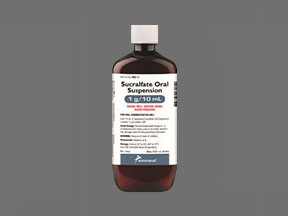
Carafate Coupons & Savings Card – Discount Prices from $42.48
Brand for: Sucralfate
My prescription
Edit
414ML of 1GM/10ML, Sucralfate (1 Bottle)
Select pharmacy

CVS
$42.48
COUPON PRICE
Albertsons
$53.82
COUPON PRICE
Walgreens
$62.41
COUPON PRICE
Walmart
$144.11
COUPON PRICECarafate savings card
Show this card to your pharmacist
CVS
$42.48
BIN
ID
PCN
GRP
019876
LH9FA81252
CHIPPO
LHX
Powered by
More prescriptions for heartburn
More prescriptions for heartburn
Price history for Carafate (brand) & Sucralfate (generic)
1 Bottle, 10ML
Average retail price for Carafate
Average retail price for Sucralfate
Average SaveHealth price for Sucralfate
Our price history data is based on aggregated prescription data collected from participating pharmacies in America. Our prescription data updates daily to reflect the latest price changes. If you notice a missing data point, it means there wasn't sufficient data available to generate a monetary value for that date.
Over the last 12 months, the average discount price of Carafate is $5.44 using the SaveHealth savings card. That's an average savings of 98.33% on Carafate with our discount card.
*Retail prices are based on pharmacy claims data, and may not be accurate when we don't have enough claims.
Carafate (Sucralfate) dosage forms
Dosage Quantity Price from Per unit 10ML 1 Box $5.92 $5.92 10ML 2 Boxes $9.34 $4.67 10ML 3 Boxes $12.76 $4.25
| Dosage | Quantity | Price from | Per unit |
|---|---|---|---|
| 10ML | 1 Box | $5.92 | $5.92 |
| 10ML | 2 Boxes | $9.34 | $4.67 |
| 10ML | 3 Boxes | $12.76 | $4.25 |
Carafate Warnings
It is crucial to understand the safety aspects of using this medication. Please carefully consider the following key points and consult your healthcare provider if you have any questions or concerns:
- Aluminum Absorption: This medication, sucralfate (Carafate), contains a minor amount of aluminum. While typically processed by the kidneys, aluminum can be absorbed into the body through the stomach.
- Kidney Function Concerns: Individuals with a history of kidney problems should exercise caution, as impaired kidney function might hinder the body's ability to eliminate aluminum effectively.
- Interaction with Aluminum Products: The risk of aluminum accumulation increases if you consume other aluminum-containing products, such as certain antacids or dietary supplements, alongside this medication.
There are no specific contraindications listed for this medication. Always consult your healthcare provider to ensure this medication is appropriate for your health needs.
Carafate Side Effects
When taking this medication, you may experience some common side effects such as constipation, dry mouth, upset stomach, and nausea. These effects are typically mild and should not cause undue concern. However, if they continue or become bothersome, it's advisable to seek guidance from a healthcare professional. In some cases, other side effects like diarrhea, vomiting, itching, dizziness, headache, and rash may occur. While these are not common, it's important to monitor your symptoms and consult a healthcare provider if you notice any of these effects, especially if they are severe. In rare instances, you might develop a serious allergic reaction. Be vigilant for symptoms such as rash, itching or swelling (particularly of the face, tongue, or throat), severe dizziness, or trouble breathing. If these occur, seek medical attention immediately, as these reactions require prompt care. Remember, this list of side effects is not exhaustive, and if you experience any unusual symptoms, it’s important to reach out to a healthcare provider for further advice.
Carafate Interactions
What is Carafate used to treat?
Carafate is used to treat and prevent ulcers in the intestines. It works by forming a protective barrier on the ulcer to promote healing and reduce discomfort.
Is Carafate the same as omeprazole?
Carafate (sucralfate) and omeprazole are not the same. Carafate is a medication that acts as a protective barrier on the lining of the stomach, while omeprazole is a proton pump inhibitor that reduces stomach acid production. They are used for different purposes in the treatment of gastrointestinal conditions.
Why would a doctor prescribe sucralfate?
A doctor may prescribe sucralfate to treat and prevent ulcers in the stomach and intestines. It works by forming a protective barrier on the ulcer site, which helps to shield it from stomach acid and promote healing. Sucralfate is also sometimes used to manage other conditions as determined by a healthcare provider.
What is the difference between Carafate and omeprazole?
Carafate (sucralfate) and omeprazole are both medications used to treat conditions related to the stomach and esophagus, but they work in different ways. Carafate acts as a protective barrier on the lining of the stomach, helping to heal ulcers by adhering to the ulcer site. Omeprazole, on the other hand, is a proton pump inhibitor that reduces the amount of acid produced in the stomach, thereby helping to treat conditions like gastroesophageal reflux disease (GERD) and promote healing of the esophagus.
Does Carafate heal stomach lining?
Carafate (sucralfate) is used to treat and manage ulcers in the stomach and intestines. It works by forming a protective barrier on the ulcer site, which can help protect the stomach lining from further damage and allow it to heal. However, it does not directly heal the stomach lining but rather facilitates the healing process by protecting the area from acid and enzymes.
